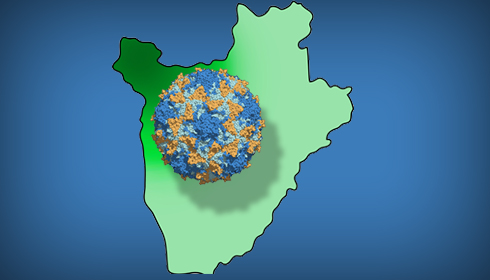
Burundi declares first polio outbreak in 3 decades
Health authorities in the landlocked East African country Burundi declared an outbreak of circulating poliovirus type 2 after confirming eight polioviruses on March 17, 2023, the first such detection in the country over three decades.
According to a World Health Organization press release, the cases were confirmed in a four-year-old child in the Isale district in the western part of the country, who had not received any polio vaccination, as well as two other children who were in contact with him. Furthermore, five wastewater samples from environmental surveillance confirmed the presence of the circulating poliovirus type 2.
Pointing out that the detection of the circulating poliovirus type 2 shows the effectiveness of the disease surveillance capacity of Burundi, Dr Matshidiso Moeti, Regional Director for Africa at the WHO, said, “Polio is highly infectious and timely action is critical in protecting children through effective vaccination.”
“We are supporting the national efforts to ramp up polio vaccination to ensure that no child is missed and faces no risk of polio’s debilitating impact,” she added.
The government of Burundi, which has declared the detection of the virus a national public health emergency, said it plans to implement a vaccination campaign to combat polio in the coming weeks, aiming at protecting all eligible children (aged 0‒7 years old) against the virus.
With technical support from WHO and the Global Polio Eradication Initiative (GPEI) the health authorities have also embarked on further epidemiological investigations, including risk assessments to determine the extent of the outbreak, the UN Health Agency informed.
Circulating poliovirus type 2 is the most prevalent form of polio in Africa, and outbreaks of this type of poliovirus are the highest reported in the region, with more than 400 cases reported in 14 countries in 2022. Circulating poliovirus type 2 infection can occur when the weakened strain of the virus in the oral polio vaccine circulates among under-immunised populations for long periods.
Acute flaccid paralysis is defined by the acute onset of weakness or paralysis with reduced muscle tone in children. There are many infectious and non-infectious causes of acute flaccid paralysis. Polio is one cause of acute flaccid paralysis. Its early detection is critical in containing a potential outbreak.
It may be noted that since the founding of GPEI, polio cases have fallen worldwide by over 99%. Stressing the urgency for eradicating polio, the UN Health agency cautioned that failure to eradicate polio may lead to a global resurgence of the disease, and over 200,000 cases of new cases could occur every year across the globe.